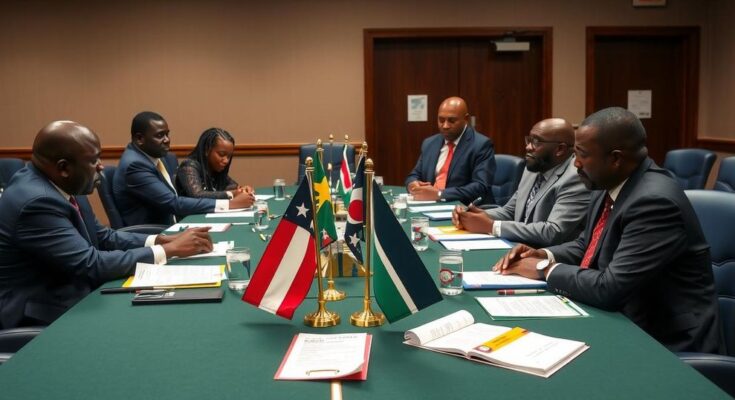The Republic of South Sudan faces severe economic challenges due to the disruption of oil exports linked to the Sudan conflict, leading to diminished growth, increased fiscal constraints, and exacerbated humanitarian issues. The government has incurred arrears and relies on monetary financing to manage high inflation and a depreciating exchange rate. Additionally, a national election has been postponed, further complicating the country’s situation.
The Republic of South Sudan continues to face significant macroeconomic challenges as a result of spillover effects from the Sudan conflict. A key concern is the disruption of oil exports, with a pipeline responsible for transporting 70 percent of the nation’s oil situated through Sudan that has remained inoperable since February 2024. The protracted repair efforts are exacerbated by limited access to affected regions. Consequently, South Sudan has experienced a dramatic decline in economic growth, exports, fiscal revenues, and foreign exchange inflows, compounding an already dire humanitarian situation characterized by acute food insecurity affecting nearly two-thirds of its population.
The South Sudanese authorities have resorted to accruing salary arrears and employing monetary financing to navigate these fiscal constraints, alongside delaying an official exchange rate adjustment. The humanitarian landscape has been further deteriorated by recent flooding and an influx of refugees. Furthermore, the national unity government, established in adherence to a peace treaty in 2018, has announced a two-year postponement of the elections originally scheduled for December 22, 2024. The ongoing challenges necessitate continued international support and strategic policy interventions to address the worsening economic and humanitarian conditions in South Sudan.
The issues confronting the Republic of South Sudan stem from both internal policy shortcomings and external factors, particularly the conflict in neighboring Sudan. The disruption of oil production is critical, as oil revenues constitute the backbone of South Sudan’s economy. Consequently, the interruption of the oil pipeline has heavily impacted economic metrics, leading to budget financing constraints that have forced the government to accumulate arrears while navigating a high-inflation environment and a depreciating exchange rate in the parallel market. The ramifications of these economic hurdles extend beyond fiscal metrics, directly affecting the humanitarian situation as many citizens face food insecurity and displacement due to conflict and natural disasters.
In summary, South Sudan is grappling with significant macroeconomic imbalances compounded by the ongoing conflict in Sudan. The suspension of oil exports, a vital economic lifeline, has resulted in a sharp decline in growth and revenue while exacerbating humanitarian crises. The response measures adopted by the government indicate a pressing need for financial and strategic support to stabilize the economy and improve the welfare of its citizens. The postponement of elections further complicates the political landscape, emphasizing the need for sustained international engagement and assistance.
Original Source: www.imf.org




